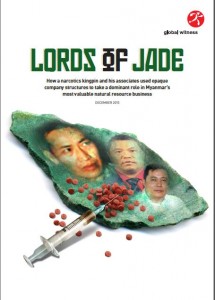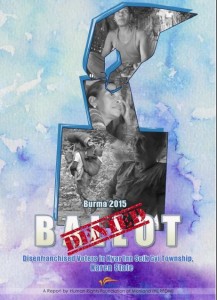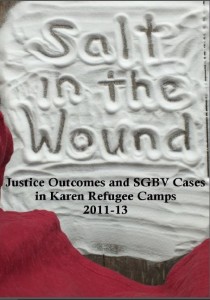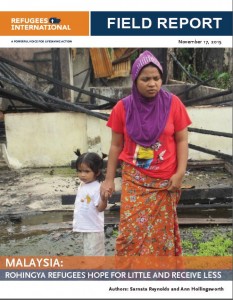ASEAN (150 found)
Myanmar: Lord of Jade
 Myanmar’s jade business may be the biggest natural resource heist in modern history. The sums of money involved are almost incomprehensibly high and the levels of accountability are at rock bottom. One of the most dominant and dangerous groups involved is a collection of companies controlled by Myanmar’s most famous drug lord, Wei Hsueh Kang […]
Myanmar’s jade business may be the biggest natural resource heist in modern history. The sums of money involved are almost incomprehensibly high and the levels of accountability are at rock bottom. One of the most dominant and dangerous groups involved is a collection of companies controlled by Myanmar’s most famous drug lord, Wei Hsueh Kang […]
Burma 2015: Ballot Denied Disenfranchised Voters in Kyar Inn Seik Gyi Township, Karen State
 On November 8, 2015, millions of voters across Burma went to the polls. Citizens seized the opportunity to exercise their right to vote in the freest election the country had seen for at least 25 years. In many ways this was an astonishing moment for democracy in Burma. However, as international media coverage praised largely successful election processes and excitement abounded at the poll’s outcome, relatively few column inches were dedicated to those left behind as this historic event took place […]
On November 8, 2015, millions of voters across Burma went to the polls. Citizens seized the opportunity to exercise their right to vote in the freest election the country had seen for at least 25 years. In many ways this was an astonishing moment for democracy in Burma. However, as international media coverage praised largely successful election processes and excitement abounded at the poll’s outcome, relatively few column inches were dedicated to those left behind as this historic event took place […]
Sexual Violence by Burmese Government Troops Continues Despite Ceasefires in Shan State
The Shan Human Rights Foundation (SHRF) has documented eight cases of sexual violence committed by Burmese government troops in southern and eastern Shan State since April 2015, all in so-called “ceasefire” areas. These cases reveal continuing patterns of impunity, and highlight that ongoing militarization and offensives by the Burma Army despite ceasefires are a key factor threatening women’s security in ethnic areas […]
• • •KWO New Report: Salt In The Wound
All women and girls, no matter where they live, have the fundamental right to be free from violence. This Report examined the extent to which women and girls who live in  the seven Karen-majority camps along the Thai-Burma border enjoy, and can exercise, this fundamental human right. Specifically, this study examined 289 cases of Sexual and Gender-Based Violence (SGBV) against women in Mae Ra Ma Luang, Mae La Oon, Mae La, Umpiem Mai, Noh Poe, Ban Don Yang and Htam Hin refugee camps from 2011 to 2013 to determine the factors contributing to official reporting of crimes as well as the justice system’s response to such crimes […]
the seven Karen-majority camps along the Thai-Burma border enjoy, and can exercise, this fundamental human right. Specifically, this study examined 289 cases of Sexual and Gender-Based Violence (SGBV) against women in Mae Ra Ma Luang, Mae La Oon, Mae La, Umpiem Mai, Noh Poe, Ban Don Yang and Htam Hin refugee camps from 2011 to 2013 to determine the factors contributing to official reporting of crimes as well as the justice system’s response to such crimes […]
Burma Army Shelling and Aerial Bombing of 6,000 Civilians in Mong Nawng Town are War Crimes
The Shan Human Rights Foundation strongly condemns the Burma Army shelling and aerial bombing of Mong Nawng town in central Shan State between November 9 and 12, 2015. The firing of shells and bombs directly into the centre of this densely populated town of 6,000 people, damaging houses and causing civilian injury, meets the definition […]
• • •Malaysia: Rohingya Refugees Hope for Little and Receive Less
 It’s been six months since as many as 1,000 Rohingya fleeing from Myanmar died in the Andaman Sea. And still, neighboring nations remain resistant to recognizing the Rohingya people’s rights as refugees. Even after neighboring governments met earlier this year and agreed to protect the Rohingya at sea, no nation has taken a leadership role in permitting them to disembark from boats safely and legally. The absence of a regional plan leaves the Rohingya vulnerable to the challenges of a perilous sea voyage, and further strands those Rohingya who have lived in Malaysia and other regional nations for up to three generations without legal rights or protection. Without a doubt, Myanmar is creating this crisis […]
It’s been six months since as many as 1,000 Rohingya fleeing from Myanmar died in the Andaman Sea. And still, neighboring nations remain resistant to recognizing the Rohingya people’s rights as refugees. Even after neighboring governments met earlier this year and agreed to protect the Rohingya at sea, no nation has taken a leadership role in permitting them to disembark from boats safely and legally. The absence of a regional plan leaves the Rohingya vulnerable to the challenges of a perilous sea voyage, and further strands those Rohingya who have lived in Malaysia and other regional nations for up to three generations without legal rights or protection. Without a doubt, Myanmar is creating this crisis […]
Burma/Myanmar Post-election Outlook: Trials for Triumph
Results announced on 13 November confirmed the overwhelming victory of the National League for Democracy (NLD) in the 8 November elections, which decided 75% of seats in Burma/Myanmar’s National and Regional Parliaments. While the military will retain its allotted 25% of parliamentary seats, the NLD now holds an overall majority in the National Parliament, giving it the power to form Burma/Myanmar’s next government and select a President […]
• • •Asian Forum for Human Rights and Development: Burma/Myanmar Elections Preliminary Findings
(Yangon, 10 November 2015) From 2-10 November 2015, the Asian Forum for Human Rights and Development (FORUM-ASIA), together with its Thai member, the People’s Empowerment Foundation (PEF) conducted an election observation mission in Yangon, Burma/Myanmar […]
• • •Burma Army troops shoot at farmers in central Shan State on election day, seriously injuring a woman and boy
On November 8, 2015, general election day in Burma, government troops shot at a group of farmers returning from harvesting their rice fields in Mong Nawng, central Shan State. A 55-year-old woman and a 15-year-old boy were seriously injured […]
• • •Burma/Myanmar Election Day: Free-est & Fairest Is Not Free & Fair
On 8 November, Burma/Myanmar held what has been called its “free-est and fairest” election in 25 years. An 80% turnout rate was reported for the 33.5 million Burmese eligible to vote in the election, which saw the first participation of democracy leader Aung San Suu Kyi’s National League for Democracy (NLD) in a general election since the (later annulled) 1990 elections […]
• • •
 All posts
All posts